First Russian-Chinese Energy Business Forum Hosted in Beijing
-350x1000.jpg)
The first Russian-Chinese business energy forum, established in July 2018 upon instruction of Russian President Vladimir Putin and Chinese President Xi Jinping, was held in Beijing. The mission of the Forum is to develop an energy dialogue between Russia and China, increase efficiency joint projects portfolio, and attract investment.
Representatives of about 90 companies from the energy, financial and IT sectors, political and public figures, diplomats and experts from Russia and China took part in the Forum. Among them were Executive Secretary of the Presidential Commission for Strategic Development of the Fuel and Energy Sector and Environmental Security and Chief Executive Officer of Rosneft Oil Company Igor Sechin; President of Transneft PJSC Nikolay Tokarev; Chairman of the Board of Inter RAO PJSC Boris Kovalchuk; Director General of RusHydro PJSC Nikolay Shulginov; Chairman of the Management Board of Gazprombank JSC Andrey Akimov; Deputy Chairman of the Management Committee of Gazprom PJSC Alexander Medvedev; General Director of TATNEFT JSC Nail Maganov; President of Neftegazholding JSC Eduard Khudainatov. The event was also attended by Minister of Natural Resources Dmitry Kobylkin; Russian Ambassador to China Andrey Denisov; Special Representative of the President of the Russian Federation on International Cooperation in the Electric Power Industry Sergey Shmatko; Deputy Minister for Economic Development Sergey Gorkov; Deputy Minister of Energy of the Russian Federation Anatoly Yanovsky; Deputy Minister of Industry and Trade of the Russian Federation Vasiliy Osmakov and many others.
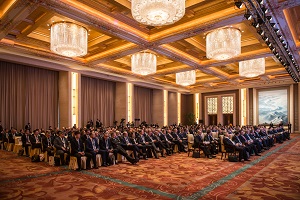 On the Chinese side, the meeting was attended by First Vice Premier of the State Council of the People’s Republic of China Han Zheng; Chairman of the Board of CNPC Wang Yilin; Director of the National Energy Administration of China Zhang Jianhua; Vice Minister of Foreign Affairs of China Le Yucheng; Vice Minister of the National Development and Reform Commission Lian Weiliang; China Gas President Huang Yong, Jereh President Wang Kunxiao; Chairman of the Board of Hengli Chen Jianhua; Alibaba Vice President Liu Xiung and others.
On the Chinese side, the meeting was attended by First Vice Premier of the State Council of the People’s Republic of China Han Zheng; Chairman of the Board of CNPC Wang Yilin; Director of the National Energy Administration of China Zhang Jianhua; Vice Minister of Foreign Affairs of China Le Yucheng; Vice Minister of the National Development and Reform Commission Lian Weiliang; China Gas President Huang Yong, Jereh President Wang Kunxiao; Chairman of the Board of Hengli Chen Jianhua; Alibaba Vice President Liu Xiung and others.
“There are executives of companies with total capitalisation of about $2 trillion present in the audience. It is hardly possible to overestimate such power!” said Executive Secretary of the Presidential Commission for Strategic Development of the Fuel and Energy Sector and Environmental Security and Chief Executive Officer of Rosneft Oil Company Igor Sechin in his welcoming address to the Forum participants. The seniority level of the participants is a clear confirmation of two countries’’ interest in strengthening energy dialogue and large-scale joint projects implementation.
RUSSIAN-CHINESE COOPERATION
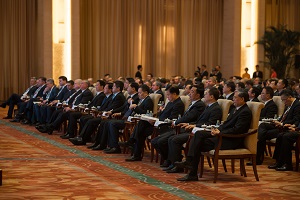 The Forum was opened by the First Vice Premier of the State Council of the People’s Republic of China Han Zheng, who read out an address from the President of the PRC Xi Jinping. “In recent years, the sides have achieved fruitful results in energy field that have contributed to the socio-economic development of the two countries. The Chinese side is ready to work together with Russia to take the Chinese-Russian energy cooperation to a new level of development,” stressed the President of the PRC in his address to the Russian-Chinese energy forum.
The Forum was opened by the First Vice Premier of the State Council of the People’s Republic of China Han Zheng, who read out an address from the President of the PRC Xi Jinping. “In recent years, the sides have achieved fruitful results in energy field that have contributed to the socio-economic development of the two countries. The Chinese side is ready to work together with Russia to take the Chinese-Russian energy cooperation to a new level of development,” stressed the President of the PRC in his address to the Russian-Chinese energy forum.
“At the moment, the Russian-Chinese comprehensive strategic interaction and partnership retain a high level of development. Multi-purpose cooperation between our countries is strengthening continuously. In recent years, the sides have achieved fruitful results in energy field that have contributed to the socio-economic development of the two countries,” said Xi Jinping in his note.
“I would like to emphasize that the strengthening of the Russian-Chinese energy cooperation is very important for jointly ensuring energy security and forming the open global economy, amid the rise in unilateralism and trade protectionism,” said Han Zheng in his speech. He called the energy dialogue “the most productive area in cooperation between Russia and China” and stressed the need to create a business-enabling environment and full-scale financial support for joint energy projects. “Cooperation is developing rapidly. And the role of the Russian-Chinese business forum in presenting of the projects, developing and establishing new contacts is crucial,” emphasized the First Vice Premier of the State Council of China.
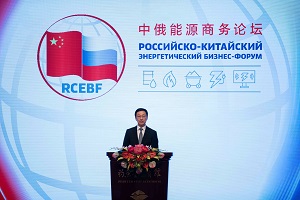 The address of Russian President Vladimir Putin to the participants of the event was read out by Chief Executive Officer of Rosneft Oil Company Igor Sechin. “The strategic partnership between Russia and China is on the rise,” wrote the Russian President in his address to the forum. “An important part of this relationship is energy cooperation, which has developed significantly over the past years. The area of mutual interests of Russian and Chinese energy companies is quite broad. This is fully confirmed by the eventful and diverse agenda of the Forum, which includes issues related to cooperation in the oil and gas and coal industries, power industry, investment, research and development, and environmental protection.”
The address of Russian President Vladimir Putin to the participants of the event was read out by Chief Executive Officer of Rosneft Oil Company Igor Sechin. “The strategic partnership between Russia and China is on the rise,” wrote the Russian President in his address to the forum. “An important part of this relationship is energy cooperation, which has developed significantly over the past years. The area of mutual interests of Russian and Chinese energy companies is quite broad. This is fully confirmed by the eventful and diverse agenda of the Forum, which includes issues related to cooperation in the oil and gas and coal industries, power industry, investment, research and development, and environmental protection.”
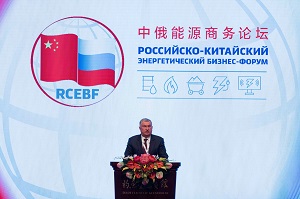 In his speech, Igor Sechin noted the significant progress in development of the relations between Russia and China over the past 10 years. So, for example, during the last decade, the commodity turnover between the countries increased more than 2.5 times: from $40 billion in 2007 to $110 billion expected by the end of the current year. During this time, fuel and energy products supply from Russia to China has tripled, and as a result, Russia has become the largest energy supplier of the PRC. Over the past 10 years, more than 300 million tonnes of oil, 55 million tonnes of petroleum-based products, 150 million tonnes of coal, and 20 billion kilowatt-hours of electricity were sent to Chinese consumers.
In his speech, Igor Sechin noted the significant progress in development of the relations between Russia and China over the past 10 years. So, for example, during the last decade, the commodity turnover between the countries increased more than 2.5 times: from $40 billion in 2007 to $110 billion expected by the end of the current year. During this time, fuel and energy products supply from Russia to China has tripled, and as a result, Russia has become the largest energy supplier of the PRC. Over the past 10 years, more than 300 million tonnes of oil, 55 million tonnes of petroleum-based products, 150 million tonnes of coal, and 20 billion kilowatt-hours of electricity were sent to Chinese consumers.
According to Sechin, Rosneft has made a significant contribution to the cooperation growth by implementing an unprecedented in its scale multi-year project of supplying oil to China together with CNPC. “Last year Rosneft delivered around 40 million tonnes of oil, thus satisfying around 6.5% of demand for fuel in China. Rosneft recognizes its leading role and responsibility in ensuring China’s energy security,” said Sechin.
To secure the faultless oil supplies, a unique pipeline system, Eastern Siberia–Pacific Ocean, was implemented; Sila Sibiri gas pipeline is under construction, as well as the biggest borderline gas-processing plant and gas chemical complex. In addition, there are successful supplies of liquefied natural gas from Yamal fields, and joint projects in coal, nuclear power, and associated areas are being developed. The investment requirement of the energy projects implemented and being implemented in the Russian East to be marketed in China is around $100 billion.
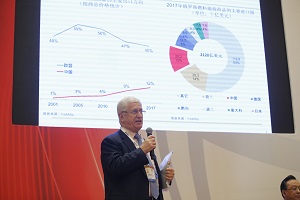 “The energy cooperation contributed to an expansion of the relations in other areas. The trade relations have gone beyond energy supplies. We see the synergy: services of Chinese banks are gaining popularity; there is an opportunity to create vertically integrated chains; we have prospects of joint work on the markets of other countries looming,” noted Igor Sechin in his speech.
“The energy cooperation contributed to an expansion of the relations in other areas. The trade relations have gone beyond energy supplies. We see the synergy: services of Chinese banks are gaining popularity; there is an opportunity to create vertically integrated chains; we have prospects of joint work on the markets of other countries looming,” noted Igor Sechin in his speech.
According to him, the potential of the Russian-Chinese cooperation in the fuel and energy sector is far from drained. “The leaders of our countries set a task to bring the commodity turnover to $200 million. Mr Wang Qishan suggested creating a regular platform to exchange opinions and projects in order to meet the set challenge as soon as possible and boost the bilateral energy cooperation. His idea gained support of the state leaders. Regular energy business forums are supposed to contribute to reviving of the spirit of the economic relations of our countries,” said Sechin.
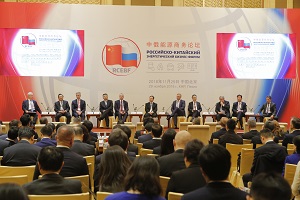 In his speech, the Chief Executive Officer of Rosneft Oil Company also stressed the importance of the Asia-Pacific Region - the most prospective with reference to energy consumption growth. The consumption of the crude energy in the Pacific Rim countries will increase 2040 times by 2040. At that, the annual oil and gas demand of China will grow by 125-250 million tonnes and 350-550 billion cubic metres respectively in the next 20-25 years. Such level of demand can be mostly satisfied with more supplies from Russia. To do that, conditions to attract investments in production and transportation of energy sources need to be created. According to Sechin, joint exploration of oil and gas resources offshore the Arctic and Russian Far East, as well as development of the navigation on the Northeast Passage may become new growing points of the Russian-Chinese cooperation.
In his speech, the Chief Executive Officer of Rosneft Oil Company also stressed the importance of the Asia-Pacific Region - the most prospective with reference to energy consumption growth. The consumption of the crude energy in the Pacific Rim countries will increase 2040 times by 2040. At that, the annual oil and gas demand of China will grow by 125-250 million tonnes and 350-550 billion cubic metres respectively in the next 20-25 years. Such level of demand can be mostly satisfied with more supplies from Russia. To do that, conditions to attract investments in production and transportation of energy sources need to be created. According to Sechin, joint exploration of oil and gas resources offshore the Arctic and Russian Far East, as well as development of the navigation on the Northeast Passage may become new growing points of the Russian-Chinese cooperation.
“Another promising opportunity is to build a renewables-based power grid complex in Russia’s Far East with the goal of power exports to China. Also, it is possible to expand the cooperation through petrochemistry and gas processing projects. I see great synergy in their joint implementation,” said Sechin.
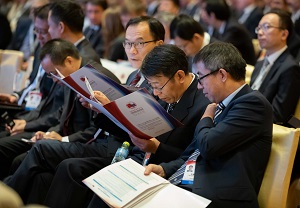 “Russia sees the prospects of economic growth acceleration mostly related to the rapid development of the eastern territories and exploration of their natural resources. In its turn, China is interested in securing of its energy and establishing of safe supply channels. I think that there are all necessary conditions to take our cooperation to the new level, to make it integral, diversified and spread over those spheres that were not included before,” said Rosneft CEO. He noted that the cooperation between Russia and China should encompass more spheres of integration of delivery chains and localization of the most modern equipment, new systemic solutions, as well as include issues of energy digitalization and project financing.
“Russia sees the prospects of economic growth acceleration mostly related to the rapid development of the eastern territories and exploration of their natural resources. In its turn, China is interested in securing of its energy and establishing of safe supply channels. I think that there are all necessary conditions to take our cooperation to the new level, to make it integral, diversified and spread over those spheres that were not included before,” said Rosneft CEO. He noted that the cooperation between Russia and China should encompass more spheres of integration of delivery chains and localization of the most modern equipment, new systemic solutions, as well as include issues of energy digitalization and project financing.
“Certain aspects of the current political conditions in the world, increasing protectionism and threat of trade wars in the world economy serve as additional incentives to cooperate more closely and make decisions faster,” concluded Sechin.
AGREEMENTS AND STATEMENT
The business agenda of the Forum covered panel discussions on key matters of the Russian-Chinese energy cooperation, expansion of the joint project portfolio, encouraging of the financing, and development of digital technology in the fuel and energy industry. Over 50 bilateral meetings were held and over two dozens agreements between energy majors of the two countries were signed at the Forum.
In particular, Rosneft signed a one-year contract on supplies of up to 2.4 million tonnes of oil to ChemChina; an agreement on creation of a gas filling stations network joint venture with Beijing Gas; a Memorandum of Understanding in science and technology with the China National Petroleum Corporation; and an agreement with Hengli Group on future cooperation in prospective upstream and downstream projects in Russia and China.
The Forum was concluded with a joint statement presenting the key goals of the Forum, including the following: to create a favourable investment climate in order to strengthen the energy cooperation; to exchange suggestions on most prospective projects; to attract investments to joint projects; to develop the conditions required for implementation of the scientific engineering potential; to prepare suggestions on improvement of the industry policy and bilateral cooperation mechanisms in the industry, et cetera.
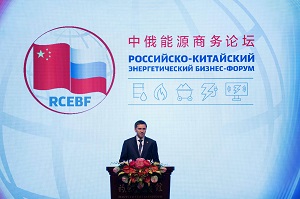 The Forum participants noted the significance of joint energy projects for the social economic development of Russia and China. Representatives of key business entities urged financial institutions of the two countries not only to provide strong support to joint projects, but also to look into new means of financing.
The Forum participants noted the significance of joint energy projects for the social economic development of Russia and China. Representatives of key business entities urged financial institutions of the two countries not only to provide strong support to joint projects, but also to look into new means of financing.
The leading role of science and innovations in the energy development was noted. “We are convinced that our efforts in this area will not only increase the economic efficiency of the cooperation, but it will give the momentum to the development of science, engineering, and information technology,” the Statement says.
The first Russian-Chinese energy business forum brought together executives of the largest enterprises in the industry and almost every person in charge of decision-making on the energy development in Russia and in China. Thus, the participants of the event had the opportunity to create the middle-term and long-term agenda of the Russian-Chinese energy dialogue.
It was decided to hold the Forum annually; next year Russia will be the host country. The Forum will contribute to expanding, informing and deepening of the Russian-Chinese energy cooperation based on mutual respect, mutually beneficial long-term cooperation and economic efficiency, as well as on the integration framework of the Belt and Road Initiative and the Eurasian Economic Union.
The agreements reached at the Forum will turn over a new page of the history of the Russian-Chinese energy cooperation.
Joint Statement of the Russian-Chinese Energy Business Forum for Media